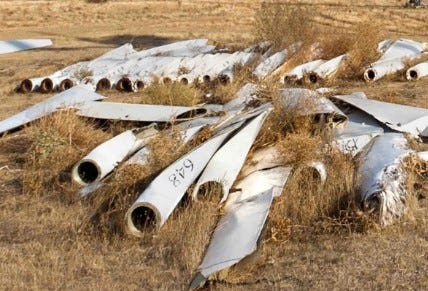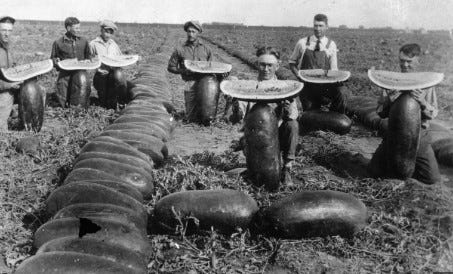Why would anyone NOT want wind turbines? Get involved: speak up to defend agriculture and your way of life.
Why would anyone NOT want wind turbines?
If you read the Gazette article linked first below, you'll see a variety of reasons.
Some are related to claims of adverse health effects (which, I have to be frank caused a lifted eyebrow on this skeptic's face), some are related to nuisances like noise or blocked views, but one I didn't see in the article relates to the Power Gab episode I linked two second below.
Lots of people talk about turbines when they go up. There's money, there are issues with setbacks, etc. Fewer (and this isn't unique to turbines, my guess is that it's common for most big projects) talk about how they come down.
That is, what is the decommissioning process when the turbines (or solar panels) age out and need to be taken down or replaced?** Is there a plan? Who pays?
Colorado (and they go into more depth in the video below -- worth a watch) has a statewide plan for oil and gas operators. Greatly simplified, those companies must put up a bond when they start to drill, that bond being in place to cover the costs of remediation and shutdown should the oil and gas company not be around when it's time to shut down. Not around here meaning that the original company folded, moved, or perhaps sold the well to someone else who then folds or leaves.
They have no such plan for renewables. None.
They mention a case of a farmer out on the Eastern Plains with turbines on his land which have been sold (more than once if memory serves) and who has no idea who he should turn to in case of problems. Why is this sort of thing tolerable for renewables but not for oil and gas?
Last thing. It's important to note that while there is no statewide policy, there is no prohibition on local policy. I know from discussions with my county commissioner (Jerry Sonnenberg) that Logan County has a county-level policy on decommissioning of renewables.
If you are wondering about your own county, and/or if you know and want to advocate, I'd recommend that you contact your county commissioners and ask. If there is no policy, point to the fact that there is no statewide protection and tell them to consider one.
You can also (but I'd do it only AFTER talking to your local officials), write or call your state senator and rep and tell them that fairness here demands parity for renewables with oil and gas.
**lifespan on a wind turbine is about 30 years or so depending on who you ask.
https://denvergazette.com/news/calhan-neighbors-oppose-wind-farm-expansion-citing-health-concerns/article_fb3cea94-c5b4-5132-892f-50a484fff7cd.html#google_vignette
Related:
The article above mentions some groups and/or individuals who have tried to work against renewables or seek better land use decisions on them (or the electrical infrastructure related to transmission of power).
If you are one of those people or groups and would like some coaching on how to bolster or grow your grow (or start one), let me know. I renew my offer to connect you to people that do that.
Message me here.
Get involved: speak up to defend agriculture and your way of life.
My recent trio of posts (see the first link below) struck a chord with a lot of folks in the Lower Arkansas River Valley.
As part of a follow up story I'm working on (why is it still a bad outcome if only a few people sell their water rights -- stay tuned), I spoke with someone from the Lower Arkansas Valley Water Conservancy District.
He shared a story with me that I thought was really powerful and worth sharing with you by way of (I hope) encouraging you to speak up for agriculture, your water, your land, and your way of life.
The second link below is to a Gazette story about the proposed Amara development, a roughly 3200 acre parcel of land South of Colorado Springs. The developers for this parcel got a pretty big shock recently when the Springs said they would not annex the parcel into the city.
This means a lot of things, but relevant to my recent stories about water, this means that any houses that go there will need their own wells and the Springs will not be providing municipal water. That is, the Springs won't need to go buying from rural areas.
Why? Again, lots of things contributed, but the thing I wanted to highlight, what the gentleman from the water conservancy district pointed me to, was a group of farmers from that district that traveled up to a city council meeting to tell the councilors to their faces what taking yet more water out of the valley meant.
They drove up and then they spoke up. I want to encourage you to do the same when there is some policy being put forth by a different city or county that would be harmful to your operation.
Drive over to the appropriate local government meeting, with others, and speak up.
If you hear of someone taking water out of your district, find out to where. Go to that city and speak up at a council meeting. Can't make it to a meeting? Call each and every councilor and tell friends to do same.
There is no law about only being able to testify in the city where you reside. There is no law about only being able to talk to your local officials.
There've been numerous times where I've written or spoken to Front Range officials with my thoughts about tax policy, development plans, etc. It may help, it may not, but you will certainly not have any results if you do nothing.
If you live in a rural area, if you're in Ag, get out and engage with local governments around the state if they're doing things that would be harmful to you or your way of life.
Speak up to defend yours.
https://open.substack.com/pub/coloradoaccountabilityproject/p/lets-talk-water-in-the-lower-arkansas?r=15ij6n&utm_campaign=post&utm_medium=web
https://gazette.com/government/la-plata-communities-amara-annexation-development-colorado-springs-fountain/article_d7e82650-5c08-11ef-862a-4f51adc8923e.html
Related:
Rachel Gabel sat down for a talk with Brandon Wark of Free State CO recently to discuss the war on AG (in particular the Denver slaughterhouse ban and the harm done chicken producers by both avian flu AND the Colorado law about cage free eggs).
Worth a watch and share the link with someone you know who will be voting in Denver so they can appreciate why they need to vote NO on the Denver slaughterhouse ban.




